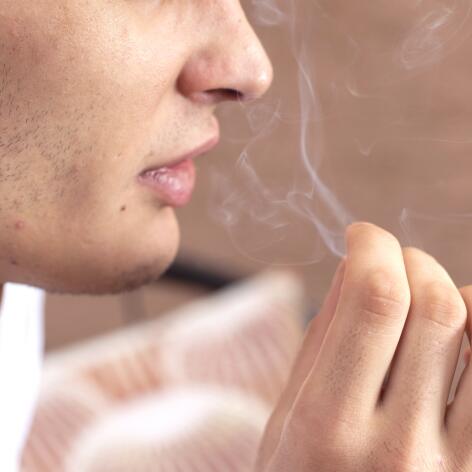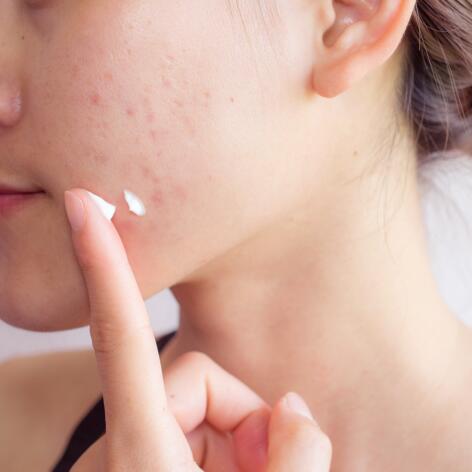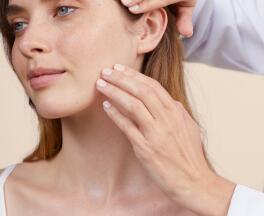Caring for acne-prone skin in teenagers
Caring for acne-prone skin in teenagers
Acne is a reality for about 80%* of teenagers, affecting boys and girls alike. The good news is that with a few good hygiene and care habits, it usually disappears if the acne is not severe. Here are some tips on how to care for acne-prone skin when your have mild to moderate acne.
What is acne?
The first acne pimples appear during puberty as a result of hormonal changes that stimulate sebum production. The skin becomes oily and the sebum may have difficulty draining through the pores. Acne then starts to develop on the face, back, shoulders and neckline.
Other factors can also contribute to acne, such as genes (ask your parents if they had acne), stress, smoking, pollution, certain medications and a diet rich in sugar. Cosmetics can also be a culprit when they’re not specifically formulated for acne-prone skin.
So how can you reduce acne? Use an appropriate daily skin care routine. Because acne-prone skin produces more sebum... And more spots.

I tried a lot of creams, but nothing helped in the long run - the spots always came back! My pharmacist advised me to keep things simple and pay more attention to my lifestyle, and the quality of my skin has improved dramatically!
Mathilde 18 years
Caring for acne-prone skin: cleansing
Skin with acne is often oily, but some treatments can dry it out. How to cleanse the skin without damaging it
My skin is oily and I have mild to moderate acne
Your aim will be to mattify and purify your skin. What’s the best way of going about this? Reducing excess sebum and removing impurities that contribute to clogged pores. Use a gentle, soap-free cleansing gel or micellar water, morning and night.
My skin is dry from my acne treatment
If your skin has been weakened by the treatment prescribed by your dermatologist, be careful not to "strip” your skin further. Choose a gentle cleansing cream specially designed for acne-prone and sensitive skin, which will help restore and protect the skin barrier.
Caring for acne-prone skin: which cream should you choose?
Your choice of moisturising cream also depends on the appearance of your skin. Is your skin oily or dried out?
My skin is oily with a few acne spots
After cleansing, it's time to moisturise. Yes, even though your skin is oily, it still needs to be moisturised! Choose a light, non-greasy day cream with absorbent microcapsules to mattify your skin. Your moisturiser should also be have a non-comedogenic, anti-blemish formula to prevent and reduce pimples. You can also apply an exfoliating mask with absorbing and cleansing properties, but use it no more than twice a week.
My skin is dry from my acne treatment
A little tip before you move on to the moisturising stage: spray your face with thermal spring water! This will help soothe your skin after cleansing and before applying your specially formulated cream for skin that’s been dried out by acne treatments. Your moisturiser should be soothing and nourishing to reconstitute the hydrolipidic film and restore comfort to your skin. When the skin is too dry, exfoliating should be avoided.
Living with acne
FRIENDLY (AND EXPERT) ADVICE
Imperfections can be tackled before they’re even visible.
The good news is that some innovative skincare products are now targeted for micro-comedones. This is the stage preceding the comedo, or acne pimple. When this type of treatment is applied, existing micro-comedones are treated and new ones are prevented from appearing. In short, we need to get to the root of the problem and break the vicious circle!
Good habits to take care of acne-prone skin
To take care of acne-prone skin, you need to assess your skin carefully first. Is your skin oily? Dry? Do you have many spots? This way, you can choose cleansing and moisturising products better suited to your skin. But the first (and most difficult) piece of advice is this: don't squeeze your spots!

Our solutions for taking care of your acne-prone skin
Eau Thermale Avène skincare products designed to reconcile you with your skin
- Avène Thermal Spring Water Spray
Thermal Spring Water
Avène Thermal Spring Water SpraySoothes - Restores the skin barrier - Calms
NEWSLETTER
We’re always here for your skin!
All our tips for taking care of your skin day to day.

Which skin care routine should you adopt?
Identify what it really needs with the help of our experts and discover the most suitable skin care routine for you.

